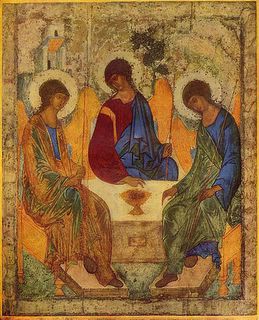33 AD -- Pentecost -- 2007 AD -- the 8th Day AD
The 50th Day of Easter:
Pentecost Sunday
Pentecost – Harvest of the Holy Spirit
Edited excerpt
Fr. James Puthuparampil OIC, Bethany Ashram :
The liturgy of Pentecost is one of the privileged occasions for us
to bear witness to the axiom that the norm of prayer is the norm
of faith ...
Since this understanding is deeply biblical in character, before dealing with the liturgical aspect, it would be good to highlight here Christ’s words about the person and activities of the Holy Spirit:
If I do not go away, the Counselor will not come to you;
but if I go, I will send Him to you.
And when He comes,
He will convict the world concerning sin and righteousness and judgment.
Jn 16:7-8
(excerpt cont:)
In the same passage Jesus added that the Holy Spirit will guide the faithful into truth, will declare the future things and will glorify the Son by continuing the Son’s mission:
When the Spirit of truth comes,
He will guide you into all the truth;
for He will not speak on his own authority,
but whatever He hears He will speak,
and He will declare to you the things that are to come.
He will glorify Me,
for He will take what is Mine and declare it to you.
All that the Father has is Mine;
therefore I said that He will take what is Mine
and declare it to you.
Jn 16:13-15
The Holy Spirit whom the Father sends in Jesus’ Name is our Teacher:
The Paraclete, the Holy Spirit,
whom the Father will send in My Name,
will teach you everything
and remind you of all I have said to you.
Jn 14:26
The Holy Spirit was some times spoken of as "the unknown person of the Holy Trinity."
But when we contemplate on the prayers of this feast in the Malankara Church, we understand that our Church has a very deep understanding of the Holy Spirit.
The above cited passages make clear that our Church’s understanding of the Holy Spirit is corollary to Jesus’ words about the Paraclete.
At the time of the Elevation of the Holy Eucharist, we profess the mission of the Holy Spirit and praise him as the One "Who completes and perfects all that is and All that will be."
 The Living God: A Catechism for the Christian Faith, by Olga Dunlop
The Living God: A Catechism for the Christian Faith, by Olga DunlopOur faith in the sanctifying and perfecting function of the Holy Spirit is reiterated in the ceremony of Pentecost: "O God, the Comforter, the Sanctifier of Churches, the Perfector of all the Divine Ministries, the Giver of Priesthood, the Performer of Baptism, the Consecrator of the Sacraments, and the Absolver of sins." Thus the epiclesis is an ongoing Pentecost, in both worlds, unto the Ages of ages ~
There are three services in the liturgy of the Pentecost of the Malankara Church: each dedicated, respectively, to the Father, to the Son, and to the Holy Spirit.
The structure of each service generally is as follows:
the introductory prayer, enyōno or responsorial, hūsōyo (consisting of pro’miyōn, sedro and hūthōmo i.e., men ālōho n’qābel), ethro or prayer of incensing, readings from the Scripture, litany, ceremony of kneeling, sprinkling of water and prayer of sealing (mānisa or Hūthōmo).
The third service of the Pentecostal Liturgy is a baptismal locus in our Tradition where we profess our faith in the Holy Spirit.
[End of adapted EXCERPT]
And thus:
The Coming of the Holy Spirit: Pouring oil to overflowing
EXCERPT:
"It has been said that the Orthodox Church is the Church of the Holy Spirit, so great is its devotion to the "Comforter, the Spirit of Truth" Who proceeds from the Father, as Christ described Him during the Mystical Supper in the Gospel of John. Every prayer, every liturgical and sacramental action of the Eastern Church is done through an invocation to the Holy Spirit. His Presence and Activity is felt everywhere in Orthodoxy which is truly the original 'Pentecostal Church.' But can we experience the Presence of the Holy Spirit in our lives today? ...
"The Orthodox Church "covers up" or "veils" the Mysteries of faith. It does not try to "expose" them as the Western Church does (e.g. Monstrances and Eucharistic Processions in the Roman Catholic Church).
"Our mystical life is one of constant 'in-spiration' and our prayer life is our living link with the Spirit. The Orthodox Church is a Church of constant prayer, the invocation of the Name of Jesus Christ in the Jesus Prayer which is, as the Fathers taught, the 'epiclesis of our Lord and Saviour' which we constantly call down on our souls to conform them to Christ.
"The mystical Icons contain all manner of symbolism as do the liturgical actions of the Priest during the Liturgy and other sacramental actions. The incense that is used to bless the Icons and the faithful - who are living Icons - is welcomed by us as we say silently, 'Thy Good Spirit will lead us along level paths, O Lord.'
"In the Spirit, we become a community of priests, the Royal Priesthood, called upon to constantly invoke the sacramental and mystical Name of Jesus over ourselves and those around us and upon the entire world God has created. We do this as a priestly exercise to sanctify everything in Christ through the Holy Spirit to the Glory of God the Father!"
(end EXCERPT.)

All icons, and particularly this icon, are a liturgical mystagogy of the Parousia and Judgement at the Eschaton: written by the hand of St. Andrei Rublev some 25 years after he received the commission, the entire Icon mediates a sacramental epektasis of the Kingdom of God and the Heavenly Liturgy: the Eucharist at the Heart of the Trinity --
the Eucharistic Life that is given us in Pentecost.



<< Home